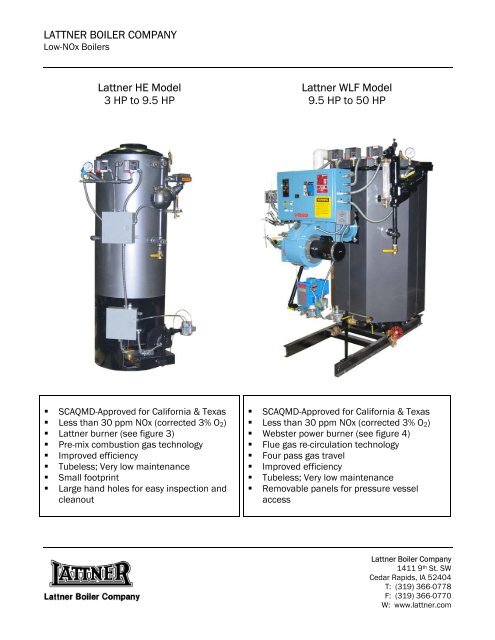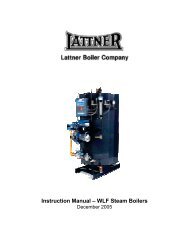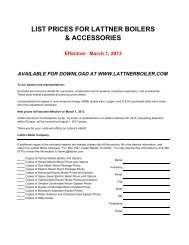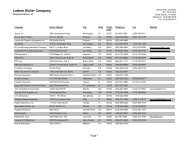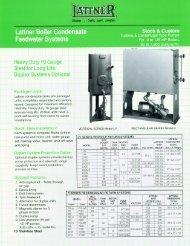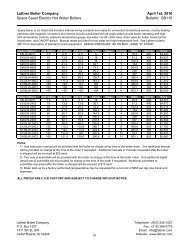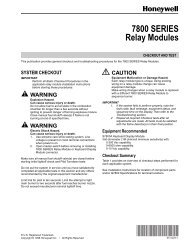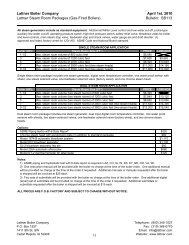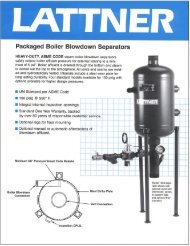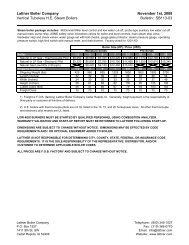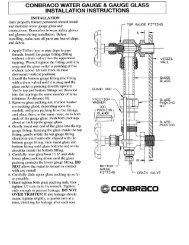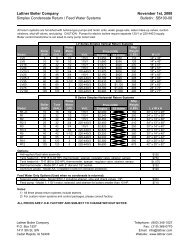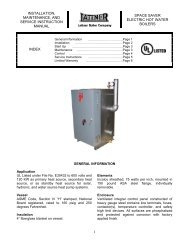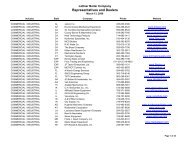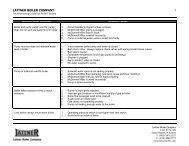Lattner Low-NOx Boiler Information - Lattner Boiler Company
Lattner Low-NOx Boiler Information - Lattner Boiler Company
Lattner Low-NOx Boiler Information - Lattner Boiler Company
You also want an ePaper? Increase the reach of your titles
YUMPU automatically turns print PDFs into web optimized ePapers that Google loves.
LATTNER BOILER COMPANY<br />
<strong>Low</strong>-<strong>NOx</strong> <strong>Boiler</strong>s<br />
<strong>Lattner</strong> HE Model<br />
3 HP to 9.5 HP<br />
SCAQMD-Approved for California & Texas<br />
Less than 30 ppm <strong>NOx</strong> (corrected 3% O2)<br />
<strong>Lattner</strong> burner (see figure 3)<br />
Pre-mix combustion gas technology<br />
Improved efficiency<br />
Tubeless; Very low maintenance<br />
Small footprint<br />
Large hand holes for easy inspection and<br />
cleanout<br />
<strong>Lattner</strong> WLF Model<br />
9.5 HP to 50 HP<br />
SCAQMD-Approved for California & Texas<br />
Less than 30 ppm <strong>NOx</strong> (corrected 3% O2)<br />
Webster power burner (see figure 4)<br />
Flue gas re-circulation technology<br />
Four pass gas travel<br />
Improved efficiency<br />
Tubeless; Very low maintenance<br />
Removable panels for pressure vessel<br />
access<br />
<strong>Lattner</strong> <strong>Boiler</strong> <strong>Company</strong><br />
1411 9 th St. SW<br />
Cedar Rapids, IA 52404<br />
T: (319) 366-0778<br />
F: (319) 366-0770<br />
W: www.lattner.com
LATTNER BOILER COMPANY<br />
<strong>Low</strong>-<strong>NOx</strong> <strong>Boiler</strong>s<br />
Basic Instructions for Start-Up of <strong>Lattner</strong> <strong>Low</strong>-<strong>NOx</strong> <strong>Boiler</strong>s<br />
The burner system of the <strong>Lattner</strong> low-<strong>NOx</strong> boiler consists of a gas valve with built-in pressure<br />
regulator, motor driven blower, pre-mix burner tubes and electronic ignition and flame monitoring.<br />
The system is basically similar to any boiler with a forced draft power burner and must be started in<br />
a similar fashion to any boiler with this type burner.<br />
In order to properly start the burner you will need the following items:<br />
1. Combustion analyzer<br />
2. Stop watch<br />
3. Calculator<br />
4. Knowledge of the BTU content of the fuel gas.<br />
5. Method of measuring the fuel gas input in cubic feet per hour.<br />
6. Formula for calculating BTU input to the burner<br />
7. Formula for calculating <strong>NOx</strong> corrected to 3%. The maximum is 30 ppm.<br />
8. CO2 / O2 / Excess Air ratio curve chart<br />
9. Carbon monoxide tester<br />
10. “U” tube manometer or aneroid gas pressure gauge<br />
Before attempting to actually start the boiler, check the function of the low water cutoffs and<br />
pressure controls. The gas piping must be properly purged up to the point of connection to the gas<br />
train. It is necessary to make sure the voltage to the boiler is correct.<br />
The boiler should then be started with the fuel gas shut off to make sure no valves will open during<br />
the burner pre-purge cycle. After this check is confirmed, the gas valve to the burner train can be<br />
opened and the burner started.<br />
It is absolutely necessary to determine the firing rate of the boiler by actually determining the<br />
volume of fuel gas supplied to the boiler. Using a stop-watch and reading the fuel gas volume in<br />
cubic feet for a specific period of time at the gas meter, the actual volume of gas in cubic feet per<br />
hour is calculated using the formula for calculating the BTU input to the burner. Further calculation<br />
using the actual BTU per cubic foot of gas, the exact firing rate can be determined. (Contact the<br />
gas utility supplier to determine the BTU per cubic foot content of the fuel gas). Adjust the fuel gas<br />
pressure regulator on the combination gas valve until the BTU input matches the BTU input rating<br />
of the boiler. As the fuel gas input is changed, readjustment of the air shutter will be required to<br />
prevent the loss of burner flame.<br />
Use the combustion analyzer probe to sample the flue gas below any draft regulator (if used). In<br />
general, the 02 reading obtained on the combustion analyzer may be around 4% or slightly higher.<br />
Adjust the air shutter on the burner blower to change the readings. As air shutter adjustments are<br />
<strong>Lattner</strong> <strong>Boiler</strong> <strong>Company</strong><br />
1411 9 th St. SW<br />
Cedar Rapids, IA 52404<br />
T: (319) 366-0778<br />
F: (319) 366-0770<br />
W: www.lattner.com
LATTNER BOILER COMPANY<br />
<strong>Low</strong>-<strong>NOx</strong> <strong>Boiler</strong>s<br />
made, the fuel gas pressure regulator will require minor adjustments to maintain the correct fuel<br />
gas BTU input to the burner. Any pressure regulator readjustment may also require minor changes<br />
in the air shutter adjustment.<br />
Adjust the air shutter while observing the <strong>NOx</strong> readings on the analyzer. Adjust the air shutter to<br />
obtain low <strong>NOx</strong> readings. The finalized burner adjustments are those that will produce the lowest<br />
corrected <strong>NOx</strong> readings using the formula for calculating <strong>NOx</strong> corrected to 3% calculation. <strong>Boiler</strong> is<br />
SCAQMD certified for 30 ppm <strong>NOx</strong>.<br />
Check the flue gas content for carbon monoxide. The reading must be below 400 parts per million<br />
but preferably around 40 parts per million.<br />
The “U” tube manometer or aneroid gas pressure gauge is used only to observe any changes in the<br />
manifold gas pressure as adjustments are being made. After any adjustments are finalized, record<br />
these readings for future use. These readings will probably be about 2 Inches water column<br />
pressure.<br />
Formula for calculating <strong>NOx</strong> corrected to 3% 02:<br />
Corrected value =<br />
17.95<br />
20.95 - 02%<br />
x ppm <strong>NOx</strong><br />
<strong>Lattner</strong> <strong>Boiler</strong> <strong>Company</strong><br />
1411 9 th St. SW<br />
Cedar Rapids, IA 52404<br />
T: (319) 366-0778<br />
F: (319) 366-0770<br />
W: www.lattner.com
LATTNER BOILER COMPANY<br />
<strong>Low</strong>-<strong>NOx</strong> <strong>Boiler</strong>s<br />
Gas Input Determination by Gas Meter Measurement<br />
The gas input to a burner should be determined by “clocking” the gas meter. Failure to apply meter<br />
correction factors can lead to over firing which could result in boiler damage or an unsafe operating<br />
condition.<br />
When determining gas flows using a gas meter, several factors must be considered to obtain an<br />
accurate measurement. The inlet gas pressure and temperature to the meter must be determined<br />
and the inlet gas pressure and temperature that was used to calibrate the gas meter must be<br />
known.<br />
The calibration pressure (commonly referred to as base pressure) and temperature may be marked<br />
on the meter dial or nameplate. If this information is not on the meter then use 4 oz (7 iwc) as<br />
base pressure and 60°F as the calibration pressure and temperature.<br />
The formula for calculating the gas flow is as follows:<br />
Cu. Ft. x 3600 x Press. Corr. x Temp. Corr.<br />
CFH =<br />
Time<br />
CFH – Cubic feet per hour<br />
Cu. Ft. – Cubic feet of gas clocked<br />
3600 – number of seconds in one hour<br />
Press. Corr. – Correction factor for inlet gas pressure different than base pressure (see figure 1)<br />
Temp. Corr. – Correction factor for inlet gas temperature different than calibration temperature<br />
(see figure 1)<br />
Time – Time in seconds required to measure Cu. Ft.<br />
Example:<br />
For example, assume the meter is calibrated with a base pressure of 4 oz and temperature of 60°F<br />
and you measure the inlet pressure to the meter as 5 psi with a gas temperature of 70°F. You<br />
determine it takes 42 seconds for 50 cu. ft. of gas to flow through the meter. For 5 psi, the<br />
pressure correction factor is 1.324 and for the 70°F the temperature correction factor is .981. The<br />
calculation is:<br />
CFH =<br />
50 x 3600 x 1.324 x .981<br />
42<br />
CFH = 5566 cubic feet per hour gas flow<br />
<strong>Lattner</strong> <strong>Boiler</strong> <strong>Company</strong><br />
1411 9 th St. SW<br />
Cedar Rapids, IA 52404<br />
T: (319) 366-0778<br />
F: (319) 366-0770<br />
W: www.lattner.com
LATTNER BOILER COMPANY<br />
<strong>Low</strong>-<strong>NOx</strong> <strong>Boiler</strong>s<br />
For heat input to the boiler, the CFH gas flow must be multiplied by the BTU content of the gas.<br />
Typically, the BTU content for natural gas is 1000 BTUs per cubic foot of gas and this number can<br />
be used if the actual number is not known. In the above example, if the BTU content of the gas is<br />
1050 BTUs per cubic foot, then the heat input would be:<br />
Heat Input = CFH x BTU per Cu. Ft. = 5566 x 1050 = 5,844,300 BTUs per Hour<br />
<strong>Lattner</strong> <strong>Boiler</strong> <strong>Company</strong><br />
1411 9 th St. SW<br />
Cedar Rapids, IA 52404<br />
T: (319) 366-0778<br />
F: (319) 366-0770<br />
W: www.lattner.com
LATTNER BOILER COMPANY<br />
<strong>Low</strong>-<strong>NOx</strong> <strong>Boiler</strong>s<br />
Figure 1<br />
<strong>Lattner</strong> <strong>Boiler</strong> <strong>Company</strong><br />
1411 9 th St. SW<br />
Cedar Rapids, IA 52404<br />
T: (319) 366-0778<br />
F: (319) 366-0770<br />
W: www.lattner.com
LATTNER BOILER COMPANY<br />
<strong>Low</strong>-<strong>NOx</strong> <strong>Boiler</strong>s<br />
Figure 2<br />
<strong>Lattner</strong> <strong>Boiler</strong> <strong>Company</strong><br />
1411 9 th St. SW<br />
Cedar Rapids, IA 52404<br />
T: (319) 366-0778<br />
F: (319) 366-0770<br />
W: www.lattner.com
LATTNER BOILER COMPANY<br />
<strong>Low</strong>-<strong>NOx</strong> <strong>Boiler</strong>s<br />
Figure 3<br />
<strong>Lattner</strong> <strong>Boiler</strong> <strong>Company</strong><br />
1411 9 th St. SW<br />
Cedar Rapids, IA 52404<br />
T: (319) 366-0778<br />
F: (319) 366-0770<br />
W: www.lattner.com
LATTNER BOILER COMPANY<br />
<strong>Low</strong>-<strong>NOx</strong> <strong>Boiler</strong>s<br />
Figure 4<br />
<strong>Lattner</strong> <strong>Boiler</strong> <strong>Company</strong><br />
1411 9 th St. SW<br />
Cedar Rapids, IA 52404<br />
T: (319) 366-0778<br />
F: (319) 366-0770<br />
W: www.lattner.com


